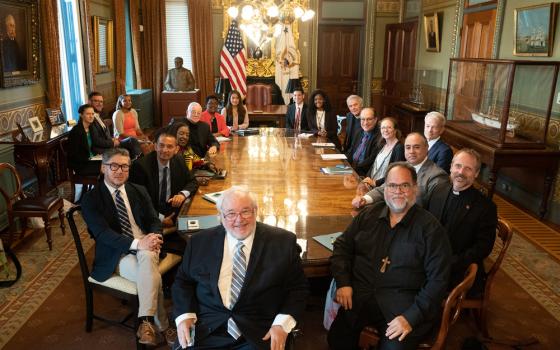It is a remarkable testament to the variety of human personality that you can get half a dozen people to look at the same moment in history, the same work of art, or the same article in a magazine and come away with wildly different interpretations of what they see. In politics today, everyone has a different thing in mind when they utter the word "populism."
The Washington Post ran an article this week posing the question: Is populism popular? It looked at the governor's race in Virginia, in which there is a conservative running as a populist running in the Republican primary and a liberal running as a populist in the Democratic primary. I say "running as a populist" because it stretches credibility to assert that graduates of Georgetown and Yale are really populists, but that is an argument for another day.
What jumped out at me was this part of the article that focuses on a Republican county chairman in rural Virginia:
In Campbell County, near the Blue Ridge mountains, Eric Zehr, who owns a house-washing company, keeps meeting people who registered to vote for the first time last year solely "based on Trump's ability to be politically incorrect." Trump won 71 percent of the vote in the county in November, but lost statewide with 44 percent.
Zehr, who entered politics a few years ago and is now a county supervisor and chairman of the county GOP, has not made his choice in the primary. He's looking not so much for a Trump sound-alike as someone who "shares my top two values, right to life and fiscal conservatism."
But Zehr, 46, worries that many Trump voters will "go back into hibernation this year. They're just delighted that the president doesn't have a close guard on his tongue; that comes across as honest and refreshing. We're hoping for more of the same from a governor — maybe not Trump's coarseness, but his willingness to go upstream."
Note that while he says "fiscal conservatism" is one of his top issues, when describing why voters like Trump it is his "ability to be politically incorrect" and that they love the fact the president is not careful with his words. You can make the argument that these people mistake coarseness for candor, but they are not entirely wrong to feel disgust at politicians who dodge and weave around the truth, suffering from too much media training, worried only about offending this interest group or that.
The populism on the right is cultural. It is rooted in being made to feel like a rube because you do not share the values of the elites. It is about being labeled a "deplorable." It is about being told you are on the wrong side of history.
Tom Perriello (Democrat), on the other hand, abandoned his soft pro-life stance the moment he got into the governor's race. His is an economic populism in which the elites to which he objects are economic elites, not cultural ones. The first item under "issues" on his website is tax policy. Emma Green's review of Sen. Elizabeth Warren's new book makes the same point. "But Warren's book also reveals the moral languages the senator is less able to speak," Green writes. "She never truly grapples with why Democrats lost, why middle-class voters would choose Trump or whether their anger might be about more than the economy. Warren sees the world through the narrow lens of economic interests, ignoring the deeply held values and beliefs that often determine people's politics. This attitude is condescending, but more important, it limits Warren's understanding of America — and why her party has failed so badly."
If I had a penny for every time I was on the receiving end of a look of shocked disbelief when I share with someone in D.C.'s Democratic Party milieu that I am pro-life, I would be very rich. Voicing the perfectly liberal sentiment that you have reservations about the long arm of government being used to force religious institutions to abide by the cultural norms of non-religious special interests can get you labeled a nut case.
Both parties need to recognize that populism only gets you so far. If Trump fails to deliver on his core economic promise to deliver jobs to those mostly rural parts of the country that have been left behind by the modern globalized economy, he and the Republicans will pay a steep price. The Democrats already failed to realize how important it was to look beyond the Beltway for insight into what motivates people and what they value, and they paid the price.
In America and throughout the West, the important distinction in politics is not so much Democrat or Republican, it is populist or establishment. But populism is more of a mood than a method, more of a primordial emotional stance than a recipe for governance. I understand and largely share the disgust many Americans feel at the neo-liberal order and its cultural accoutrements, but at least it aimed at liberal ideals. Can either party fashion a broadly based populism that is wedded to traditional liberal or conservative political ideals? Can some new political alignment emerge that both captures the popular imagination and directs it towards humane, tolerant ends? Whichever party gets there first wins.
[Michael Sean Winters covers the nexus of religion and politics for NCR.]







